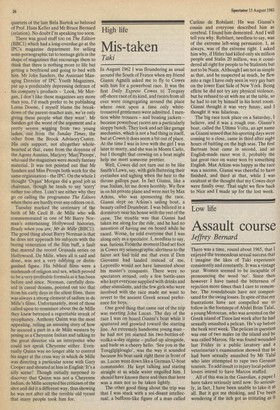High life
Mis-taken
Tab
In August 1962 I was floundering as usual around the South of France when my friend Gianni Agnelli asked me to fly to Cowes with him for a powerboat race. It was the first Daily Express Cowes to Torquay off-shore race of its kind, and racers from all over were congregating around the place where once upon a time only whitetrousered gentlemen were admitted. I mention white trousers ŌĆö and boating jackets ŌĆö because powerboat racers are a particularly sloppy bunch. They look and act like garage mechanics, which is not a bad thing in itself, but at Cowes it does seem a bit out of place. At the time I was in love with the girl I was later to marry, and she was in Monte Carlo, but I thought that crewing on a boat might help me meet someone prettier.
Well, Cowes did not turn out to be like Smith's Lawn, say, with girls fluttering their eyelashes and sighing when the heir to the throne gallops past. In fact Gianni, like a true Italian, let me down horribly. We flew in on his private plane and were met by Max Atkins, who was sponsoring the race. Gianni slept on Atkins's sailing boat, a beauty called Drumbeat. I was billeted in a dormitory near his house with the rest of the crew. The trouble was that Gianni had taken me along for the ride, and he had no intention of having me on board while he raced. Worse, he told everyone that I was along only as a spectator. I, needless to say, was furious.From the moment I had set foot in Cowes my seismographic alertness to the fairer sex had told me that even if Don Giovanni had landed instead of me, Leporello would not have lamented about his master's conquests. There were no spectators around, only a few battle-axes who kept everyone supplied with drinks and other stimulants, and the few girls who were involved with the race made me want to revert to the ancient Greek sexual preference for boys.
One good thing that came out of the trip was meeting John Lucan. The day of the race I was on board Gianni's boat while it sputtered and growled toward the starting line. An extremely handsome young man ŌĆö he had not yet started his two-bottles-ofvodka-a-day regime ŌĆö pulled up alongside, and bade us a cheery hello. 'See you in the Torqglglglouglo', was the way it sounded because his boat sank right there in front of us. Lucan went down like a German U-boat commander. He kept talking and staring straight at us while water engulfed him. I should have known there and then that here was a man not to be taken lightly.
The other good thing about the trip was that I was stuck with a soi-disant intellectual, a buffoon-like figure of a man called Carlino de Robilant. He was Gianni's cousin and everyone described him as cerebral. I found him demented. And I will tell you why. Robilant, needless to say, was of the extreme left-wing persuasion. I, as always, was of the extreme right. I asked him why, if Hitler had killed only six million people and Stalin 20 million, was it considered all right for people to be Stalinists but not to be Nazis. Although I am not as simple as that, and he suspected as much, he flew into a rage I have only seen in very gay bars on the lower East Side of New York. Being effete he did not try any physical violence, but he refused to sit with me at the table, so he had to eat by himself in his hotel room. Gianni thought it was very funny, and I thought it was hilarious.
The big race took place on a Saturday, I believe, and it was a rough one. Gianni's boat, called the Ultima Volta, an apt name as Gianni sensed that his sporting days were coming to a close, came in third after eight hours of battling on the high seas. The first Bertram boat came in second, and an English-made racer won it, probably the last great race on water won by something English. Max Atkins was happy as the race was a success, Gianni was cheerful to have finished, and third at that, while I was exultant at the thought that my Cowes days were finally over. That night we flew back to Nice and I made up for the lost week.


































 Previous page
Previous page